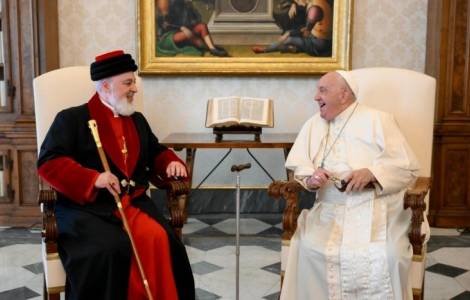
Vatican Media
Vatican City (Agenzia Fides) - An embrace under the eyes of the Risen Christ painted by Perugino and the announcement of the inscription in the Roman Martyrology of one of the most venerated Fathers of the Syro-oriental tradition. Thirty years after the signing of the Common Christological Declaration, aimed at reaffirming the common faith in Christ, and forty years after the first visit to Rome of an Assyrian Patriarch, the Catholic Church and the Assyrian Church of the East continue the path of dialogue and prayer, towards the restoration of a full and complete visible communion.
The Common Christological Declaration, signed on 11 November 1994 by Saint John Paul II and Catholicos Patriarch Mar Dinkha IV, was the central theme of the meeting, which took place at the Apostolic Palace, between Pope Francis and Mar Awa III, Catholicos Patriarch of the Assyrian Church of the East. Also present were the members of the Joint International Commission for Theological Dialogue between the Catholic Church and the Assyrian Church of the East. The commission established by the same Declaration, has recently launched a new phase of dialogue on the liturgy in the life of the Church.
The thanks of the Supreme Pontiff are addressed precisely to the members of the Joint Commission for their commitment. “Indeed, without your work, these doctrinal and pastoral agreements would not have been possible,” Pope Francis said in his address, before adding: “I am delighted with the publication of a commemorative book, with the various documents marking the stages of our journey towards full communion, with a joint preface by Your Holiness and myself.
Indeed, theological dialogue is indispensable in our journey towards unity, since the unity we yearn for is unity in faith, while the dialogue of truth must never be separated from the dialogue of charity and the dialogue of life. In this way, it is a complete and human dialogue.”
Full unity in faith, the Bishop of Rome stressed, “has already been achieved by the saints of our Churches. They are our best guides on the path towards full communion. Therefore, with the agreement of Your Holiness and the Patriarch of the Chaldean Church, and encouraged by the recent Synod of the Catholic Church on Synodality, I am pleased to announce that the great Isaac of Nineveh, one of the most venerated Fathers of the Syro-Oriental tradition, acknowledged as a teacher and a saint by all traditions, will be added to the Roman Martyrology.
A monk and bishop in the second half of the 7th century, born in present-day Qatar, where he had an early monastic experience, Isaac was ordained bishop of the ancient Church of the East for the city of Nineveh, near present-day Mosul (Iraq), by the Catholicos of Seleucia-Ctesiphon, George I. After a few months of episcopacy, he asked to return to monastic life and retired to the monastery of Rabban Shabur in Beth Huzaye (in present-day south-west Iran). It was there that he composed several collections of discourses with ascetic-spiritual content that made him famous.
Although belonging to a Church that was no longer in communion with any other, because it had not accepted the Council of Ephesus in 431, Isaac's writings were translated into all the languages spoken by Christians: Greek, Arabic, Latin, Georgian, Slavic, Ethiopian, Romanian and others. Isaac thus became an important spiritual authority, especially in monastic circles of all traditions, who quickly venerated him among their saints and fathers.
Through his intercession, the Pope hoped, "the Christians of the Middle East always bear witness to the Risen Christ in those war-torn lands. And may the friendship between our Churches continue to flourish, until the blessed day when we can celebrate together at the same altar and receive the communion of the same Body and Blood of the Saviour."
The inclusion of Saint Isaac in the Roman Martyrology, underlines a statement from the Dicastery for Promoting Christian Unity, "shows that holiness did not stop at separations and that it exists beyond confessional boundaries. As the Second Vatican Council declared: 'It is right and salutary to recognize the riches of Christ and virtuous works in the lives of others who are bearing witness to Christ, sometimes even to the shedding of their blood' (Unitatis Redintegratio 4)".
The statement from the Dicastery adds: "It is hoped that the inclusion in the Roman Martyrology of Isaac of Nineveh, witness to the precious Christian spiritual heritage of the Middle East, will contribute to the rediscovery of his teaching and to the unity of all the disciples of Christ". (F.B.) (Agenzia Fides, 9/11/2024)